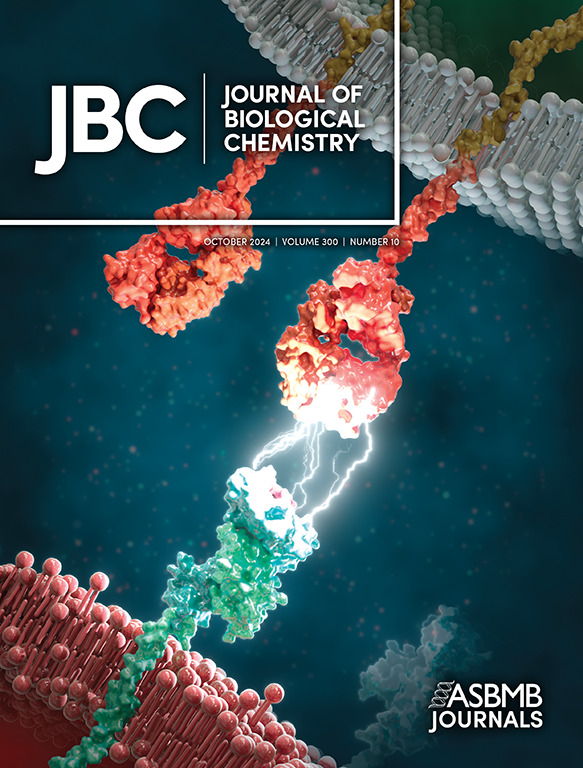铁硫簇组装蛋白IscU2的抗氧化能力是由天冬氨酸代谢介导的,从而促进肿瘤的存活。
IF 4
2区 生物学
Q2 BIOCHEMISTRY & MOLECULAR BIOLOGY
引用次数: 0
摘要
环境营养水平影响癌细胞代谢,激活癌细胞应对营养应激的适应性机制。然而,目前尚不清楚肿瘤细胞是如何通过代谢重编程在营养胁迫环境下维持生存的。我们的研究重点是营养缺乏诱导的氧化损伤,揭示了铁硫(Fe-S)簇组装蛋白IscU2的表达增加对葡萄糖缺乏条件下胰腺导管腺癌(PDAC)细胞的存活至关重要。葡萄糖缺乏通过激活AMPK通路诱导IscU2表达,使IscU2表现出在葡萄糖充足条件下缺乏的抗氧化特性。上调的IscU2通过增强线粒体代谢,包括呼吸和三羧酸循环,以Fe-S簇依赖的方式刺激天冬氨酸合成。值得注意的是,在葡萄糖缺乏的PDAC细胞中,由IscU2缺失引起的氧化应激和凋亡可以通过天冬氨酸介导的NADPH产生来恢复。这些发现强调了IscU2在PDAC细胞代谢中的重要性及其在营养缺乏条件下支持细胞存活的基本功能。本文章由计算机程序翻译,如有差异,请以英文原文为准。
Antioxidant capacity of the iron-sulfur cluster assembly protein IscU2 is mediated by aspartate metabolism to promote tumor survival.
Environmental nutrient levels affect cancer cell metabolism, activating adaptive mechanisms in cancer cells to deal with nutrient stress. However, it remains unclear how tumor cells sustain survival under nutrient-stress circumstances through metabolic reprogramming. Our study focused on nutrient deficiency-induced oxidative damage, revealing that increased expression of the iron-sulfur (Fe-S) cluster assembly protein, IscU2, is essential for the survival of pancreatic ductal adenocarcinoma (PDAC) cells in glucose-deficient conditions. Glucose deficiency induces IscU2 expression via the activation of the AMPK pathway, allowing IscU2 to exhibit antioxidant properties that are absent under glucose-sufficient conditions. Upregulated IscU2 stimulates aspartate synthesis by bolstering mitochondrial metabolism, including respiration and the tricarboxylic acid cycle, in a Fe-S cluster-dependent manner. Notably, oxidative stress and apoptosis induced by IscU2 depletion in glucose-deficient PDAC cells can be restored by aspartate-mediated NADPH production. These findings highlight the importance of IscU2 in PDAC cell metabolism and its essential function in supporting cell survival under nutrient-deficient conditions.
求助全文
通过发布文献求助,成功后即可免费获取论文全文。
去求助
来源期刊

Journal of Biological Chemistry
Biochemistry, Genetics and Molecular Biology-Biochemistry
自引率
4.20%
发文量
1233
期刊介绍:
The Journal of Biological Chemistry welcomes high-quality science that seeks to elucidate the molecular and cellular basis of biological processes. Papers published in JBC can therefore fall under the umbrellas of not only biological chemistry, chemical biology, or biochemistry, but also allied disciplines such as biophysics, systems biology, RNA biology, immunology, microbiology, neurobiology, epigenetics, computational biology, ’omics, and many more. The outcome of our focus on papers that contribute novel and important mechanistic insights, rather than on a particular topic area, is that JBC is truly a melting pot for scientists across disciplines. In addition, JBC welcomes papers that describe methods that will help scientists push their biochemical inquiries forward and resources that will be of use to the research community.
 求助内容:
求助内容: 应助结果提醒方式:
应助结果提醒方式:


